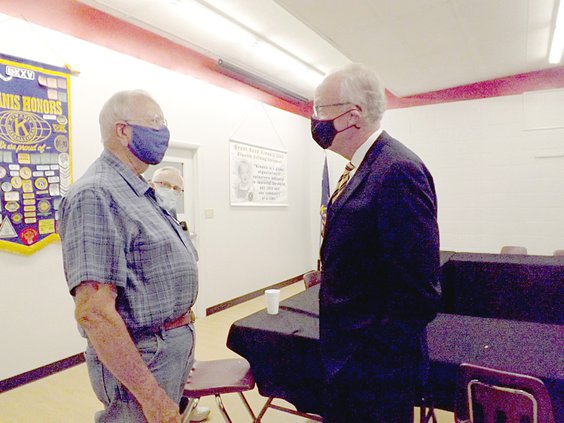U.S. Senator Jerry Moran visited Great Bend on Wednesday, speaking at the Noon Kiwanis Club meeting. While he mentioned briefly that he expects Judge Amy Barrett’s nomination to the Supreme Court will be approved soon, Moran spent more time talking about COVID-19 – what’s been done and what comes next.
“The Paycheck Protection Program has made a difference in lots of businesses, on Main Street and elsewhere. This is the opportunity to borrow money from the SBA; if the business continues to employ its employees that can be forgiven,” he said. “Talking to folks across Kansas, it has kept doors open and businesses that allow people to continue to be employed in difficult circumstances,” Moran said.
He voted for the COVID-relief measures passed by Congress and said he’s willing to look at another bill.
“But I will tell you that I am not of the mindset that we ought to be spending more trillions of dollars. I think when we started this, many of us thought that COVID was something that we were going to put up with over the next couple of months – we just needed to tide ourselves over and get us through the process in which we’d get back to normal in a few months. That hasn’t turned out to be the case. But that doesn’t mean that we can spend another three, four or five trillion. In my view, we cannot prop up the U.S. economy with borrowed money or taxpayer dollars, however you want to describe it, for an indefinite period of time.”
Moran said he expects Congress will resume working on the next COVID-relief bill after Barrett’s nomination is approved. It should include funding for things like “protection equipment for people in hospitals and nursing homes and businesses, so we can slow or reduce the spread of the virus,” he said. “My view is that the economy cannot recover until health care recovers and it’s safe to be out and about.”
He said Congress could consider extending the Paycheck Protection Plan a while longer.
“I still think there’s a huge problem and an area that really slipped through the cracks, and that will be restaurants, bars, hotels, venues, theaters and attractions. It is harder to get any kind of economic survival if you’re in those businesses,” he said.
Voting by mail
Moran said he’s been interested in the wellbeing of the U.S. Post Office for a long time.
“I’m probably the lead Republican in the Senate trying to figure out how we can get the Post Office in financial condition. It matters, in my view, particularly to rural elderly people,” he said. “It matters to veterans; 90-plus percent of prescriptions delivered to a veteran go through the Postal Service.”
While he said the Postal Service has its challenges, people should not be afraid to vote.
“It’s very important; I would not want anybody to NOT vote because they thought the vote might be fraudulent if they mailed it. I want a postal service that’s going to get the job done. I met two weeks ago with the Postmaster General, expressing the importance of postal service for rural America,” he said.
“I do think that voting is so important that we all, when it’s over, whoever wins – no one should be able to claim that it was fraudulent or it was a ‘fake election.’ We are divided in so many ways in this country. One of the places I hope we avoid that continued division is a belief that the outcome of the election was not what really happened,” he said. “We may not like the outcome of any election, but we have to have a sense that the voters have spoken for this period of time. ... So my hope is that if you believe that the Postal Service will not deliver your ballot, don’t not vote. Figure out the other way to do it, show up at the courthouse.”
Mental Health Care for veterans
While members of Congress are often divided on the “big issues,” Moran said a lot of things do get done. When he introduces a bill, he always tries to find a Democrat to cosponsor it.
“Generally, I think that Congress is more cooperative than it would appear to all of us, except when it comes to the really big issues,” he said. “I just became chairman of the Senate Committee on Veterans Affairs in January and we announced that our number one priority was to try to provide mental health services to try to reduce veteran suicide. And working with Jon Tester, a Democrat from Montana who is the ranking Democrat on the committee I chair, we were successful in passing (a bill). In fact, the President is expected to sign this week, probably on Saturday, the most significant piece of legislation dealing with veterans issues in a long time.”
The Commander John Scott Hannon Veterans Mental Health Care Improvement Act awaiting the president’s signature funds community organizations that work with veterans, among other things. The bill honors the legacy of Commander John Scott Hannon, a member of the Navy SEALs who served in the U.S. Navy for 23 years. Scott died by suicide on Feb. 25, 2018.





